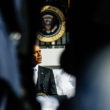The good news is that the report by the Iraq Study Group (ISG), entitled “The Way Forward: A New Approach,” has unleashed a public debate in the United States. Three out of four Americans responding to the latest USA Today/Gallup poll support its key policy recommendations. The bad news is that the bipartisan ISG, co-chaired by James Baker, Secretary of State under President George H.W. Bush, has overlooked a monumentally important fact of recent history: The presence of non-Muslim forces in a Muslim country inevitably engenders a jihadist movement among the occupied Muslims and their co-religionists abroad. This was the case with the Soviet troops in Afghanistan in the 1980s. And, in the succeeding decade, it was the continued presence of the American forces in Saudi Arabia long after the U.S.-led Coalition forces had expelled the Iraqis from Kuwait in March 1991 that alienated Osama bin Laden, then an integral part of the super-affluent elite of the Saudi kingdom, and set him on the path of rebellion and anti-American terrorism and gave birth to Al Qaeda. President George W. Bush offered an equivocal response to the 100-page ISG report, combining his description of the the panel’s 79 recommendations as “very constructive” and “worthy of study” with repeated mentions of the upcoming reviews of the situation in Iraq by the Pentagon, State Department, National Security Council, and Central Intelligence Agency. Meanwhile, he rejected the idea of dealing with the regimes in Damascus and Tehran unless and until they meet his preconditions. Iran has to cease enrichment of uranium under the supervision of the International Atomic Energy Agency, Bush insisted. This is most unlikely to happen. And Syria has to stop playing host to the Palestinian leaders of Hamas and allying itself with the Hezbollah of Lebanon. This too is a most improbable outcome. At the core, Bush’s response to the ISG review reflected his uneasy relationship with Baker, a long-standing friend of the Bush clan and a formidable lawyer whose legal maneuverings in the November 2000 presidential election whisked Bush into the occupancy of the White House. Bush coupled his politeness in public to Baker and his report with a private message relayed to the media through his aides that the White House considered the ISG recommendations to be out-of-date, more in tune with the Middle East of 1991, when Baker was the Secretary of State. This is roughly the view that Condoleezza Rice, the current Secretary of State, holds of the ISG report. Though she did not express her opinion publicly, she is known to be put off by the undisguised tutorials delivered by Baker in his briefings to the media on the report and his laying out of a blueprint for an alternative Middle East policy by Washington. In private, though, Rice’s aides are spelling out her view, arguing that, contrary to what Baker is implying, she is pursuing a coherent and effective strategy in the Middle East. She is trying hard to increase Syria’s isolation, they assert, helped by the fact that much of the Arab world is opposed to President Bashar Assad’s attempts to overthrow the pro-Washington government of Lebanese Prime Minister Fouad Siniora. In her efforts to isolate Iran she is playing on the fears of Saudi Arabia, Egypt and Jordan that Tehran is maneuvering to dominate the Middle East through the acquisition of a nuclear bomb. True to form, outgoing Defense Secretary Donald Rumsfeld was blunt in his remarks. He dismissed the ISG’s recommendations as unoriginal. “I can’t think of a thing that anyone’s thought of that [chairman of the joint chiefs of staff] General Pace and [head of the Central Command] General Abizaid and those folks have not been working on and analyzing and studying and adjusting to over time,” he declared. These top military leaders, however, could not have considered high-level diplomatic options mentioned in the ISG review—an area outside their jurisdiction.
A FLAWED REVIEW—The ISG document is flawed on several counts. The crisis in Iraq is much worse than what the report conveys. Although harshly critical of the White House’s war policy, it grossly understates the extent to which the administrative and social systems in Iraq have broken down. The emigration of 100,000 Iraqis a month to the neighboring Arab states and the Gulf monarchies provides a chilling index. Already a third of the middle class, the backbone of a modern society, has fled. Most of the rest are planning to leave as soon as their circumstances allow. This validates the criticism of the ISG report by many Iraqis. They point out that ISG members were in Iraq for only four days, and that they did not stir out of the hermetically insulated Green Zone in Baghdad. Under the heading “Neighboring Regimes’ Concerns,” on the first page of the document, the authors write that “Ambassadors from neighboring countries told us that they fear the distinct possibility of Sunni-Shiite clashes across the Islamic world. . . . Such a broader sectarian conflict could open a Pandora’s Box of problems—including the radicalization of problems, mass movements of populations and regime changes—that could take decades to play out.” The tragic fact is that when Bush and British Prime Minister Tony Blair rushed to invade Iraq in March 2003, alleging a global threat to peace and security by Iraqi President Saddam Hussein’s (mythical) weapons of mass destruction program, they opened the proverbial Pandora’s Box. Now they are pathetically unable to close it—a failure whose grave consequences the world will have to cope with long after they are dead and buried. While the ISG report highlights the calamitous outcome of the Sunni-Shiite fighting in the Muslim world, it is strangely silent on the catastrophic implications of such violence on the oil supplies from the Persian Gulf region, which contains three-fifths of the global reserves, on which the world’s economies depend heavily. It is worth noting that the underprivileged Shiite minority in Saudi Arabia, for instance, is concentrated in the oil-bearing Eastern Province of the kingdom. And Shiites form a quarter of the population of oil-rich Kuwait. Disappointingly, while recommending a withdrawal of all U.S. combat troops by early 2008—coupled with an enhanced embedding of American military instructors with Iraq’s armed forces, increasing their number to 20,000—the ISG review fails to address the root cause of violence in Iraq today: its occupation by foreign, infidel troops. On the positive side, the ISG review recommends a two-track regional diplomatic offensive: a fresh Middle East peace conference (like the one in Madrid in 1991) to negotiate Israel’s return of the Golan Heights to Syria and its resumption of peace talks with the Palestinians on the basis of land for peace; also, it favors the convening of an International Iraq Support Group, consisting of the U.S., the European Union, the United Nations, and Iraq’s neighbors, including Iran and Syria. But with the Bush administration’s running short of time and credibility, in practical terms the odds against a new Middle East peace conference yielding positive results in the near future are long. Moreover, with the participation of Iran and Syria ruled out due to Bush’s inflexibility, the convening of an international Iraq support group would be meaningless. It is worth recalling that, when faced with Israel’s refusal to recognize the Palestine Liberation Organization (PLO), Baker came up with the idea of including Palestinians in the Jordanian delegation to the Middle East Peace Conference in 1991. Later when these Palestinian delegates turned out to be the PLO’s secret nominees, it was too late for Israel to wriggle out of the negotiations with the “Jordanian” delegation. No such nimble mind is at work now at the upper echelons of the White House or the State Department.
THE ISG’S BLINKERED VISION—Following the well-worn Western-centered pattern of thinking, focused on North America and the European Union, the ISG ignores such multinational organizations as the Arab League and the Islamic Conference Organization (ICO). This oversight stems from ISG members’ failure to correctly trace the root of the violence that has gripped Iraq today to the occupation by foreign troops: soldiers who are non-Muslim. They failed to register the statement that Gen. Sir Richard Dannatt, British chief of General Staff, made in October: “We are in a Muslim country [of Iraq] and Muslims’ views of foreigners in their country are quite clear.” Actually, Iraqi Muslims are not hostile to “foreigners” per se. They are hostile to the occupation of a Muslim country by non-Muslims as well as interference by non-Muslim powers in Muslim affairs. ISG panelists also failed to take into serious account a recent poll in Iraq showing that 78 percent of Iraqis felt that the presence of foreign (non-Muslim) troops was provoking more conflict than preventing it, and 58 percent thought that if the U.S. left within six months it would decrease violence.
As staunch nationalists and pious Muslims, Iraqis feel humiliated and enraged by the continued occupation of their land by tens of thousands of infidel troops from America and Britain. A pollby worldpublicopinion.org, published in late September, revealed that 92 percent of Sunnis and 62 percent of Shiites in Iraq approve of attacks on the U.S.-led forces. Iraq is an Islamic country; its population is 97 percent Muslim. Pious Muslims consider it their religious duty to struggle to end the occupation of a Muslim country by non-Muslims. During the battle between the Iraqi and American forces in the Shiite holy city of Najaf in March 2003, Grand Ayatollah Ali al-Sistani, the spiritual leader of Iraqi Shiites, called on Muslims worldwide to “help us in fierce battle against infidel followers who have invaded our homeland.” Later, Sistani urged his followers to vote in the general election to the Transitional Assembly in January 2005 and the referendum on the new constitution in October in order to expedite the infidel troops’ exit from Iraq. By contrast, Sunni insurgents, consisting of nationalists and Islamists, urged boycotting the parliamentary election, arguing that such ballots conducted under the aegis of foreign troops were religiously illegitimate. The Islamists among Sunni insurgents equated the electoral participation by Shiites with collaboration with the infidel occupiers. So they began targeting Shiites. Unlike the American or British troops—well protected inside and outside their garrisons—ordinary Shiite civilians are very vulnerable. Much of the rage and abasement felt by Iraqis due to the continued occupation by infidel troops has thus gotten diverted into sectarian violence.
A MUSLIM SOLUTION—More than U.S. combat troops and military instructors, Iraq needs peacekeepers, mandated to stabilize that hapless country, to provide time and space to Shiite, Sunni and Kurdish leaders to hammer out compromises within the framework of Iraq as a single state.
Washington should turn to the U.N. Security Council to provide a stabilization force, and the Security Council should then approach the Arab League and the ICO for help. With a U.N. mandate, Arab troops would become internationally sanctioned peacekeepers in Iraq. The 22-member Arab League has a history of peacekeeping missions. In 1961 it dispatched troops from Egypt, Jordan, Saudi Arabia and Sudan to Kuwait when that newly independent country was threatened by Iraq. Its Arab Deterrent Force, consisting of troops from six countries, served as peacekeepers in Lebanon from 1976 to 1982 (it was only after Israel invaded Lebanon and the League failed to renew its six-month mandate that Syria got deeply embroiled in the Lebanese civil war). Beyond the Arab League is the ICO, consisting of 57 Muslim-majority countries, with its headquarters in Jeddah, Saudi Arabia. At its emergency meeting in April 2004 in Malaysia, then the ICO chair, six nations offered troops for a stabilizing force in Iraq but only under the U.N.’s command. They were Bangladesh, Indonesia, Malaysia, Morocco, Pakistan and Yemen—none of them an immediate neighbor of Iraq. This met with the condition that the Iraqi leaders had imposed on the basis that each of its immediate neighbors had an agenda of its own regarding Iraq. In sectarian terms, Yemen is divided almost equally between Sunnis and Shiites, and this is reflected in its army. And since Shiites are a substantial minority in Pakistan, its army too has Shiite soldiers. So a combined force from these half a dozen countries would, beneficially, have both Sunni and Shiite troops. Soon after being appointed by Paul Bremer, the American viceroy in Iraq, as the interim prime minister in June 2004, Iyad Allawi discussed the ICO offer with U.S. Secretary of State Colin Powell in Riyadh. Powell insisted to him that the troops from the Muslim nations must be placed under U.S. command. This was unacceptable to Muslim leaders, conscious of America’s unpopularity among their citizens. So the proposal died. A revived proposal should require the American and British troops to withdraw in stages from Iraq and hand over the stabilization task to the combined force of the Muslim countries under U.N. authority. The Bush administration may not like the idea of turning over part of its “war on terrorism” to Muslim nations. But it must face a fact: America has little in common with Iraq. The alienation between the occupier and the occupied extends not only to race, religion, language, and social and tribal mores but also to such basic political values as a real commitment to democracy. A Muslim stabilization force in Iraq would dispel the intense alienation that exists now between Iraqis and the American troops. The brown-skinned Muslim troops would be seen praying in the same mosques as Iraqis, and they would have an innate understanding of the social and cultural mores of the local people, since they come from societies similar to that in Iraq. They would not be advancing an agenda like preaching a Jeffersonian model of democracy or seeking preference in exploiting Iraqi oil. In short, the only way to cure the malady that is leading to the death of Iraq as a unified state is to diagnose it properly—to trace its origin to the poison injected into Iraq’s body politic by its continued occupation by tens of thousands of foreign, non-Muslim troops—and to cure this by draining the venom and replacing it with a healing medicine of lightly armed Muslim peacekeepers.
Dilip Hiro is a London-based journalist and the author of Secrets and Lies: Operation “Iraqi Freedom” and After and The Iranian Labyrinth, both published by Nation Books. His forthcoming book is Blood of the Earth: The Battle for the World’s Vanishing Oil Resources. His article about how the U.S. invasion of Iraq has set back the cause of democracy across the broader Middle East appeared in the June 1, 2006 issue of the Washington Spectator.






0 Comments